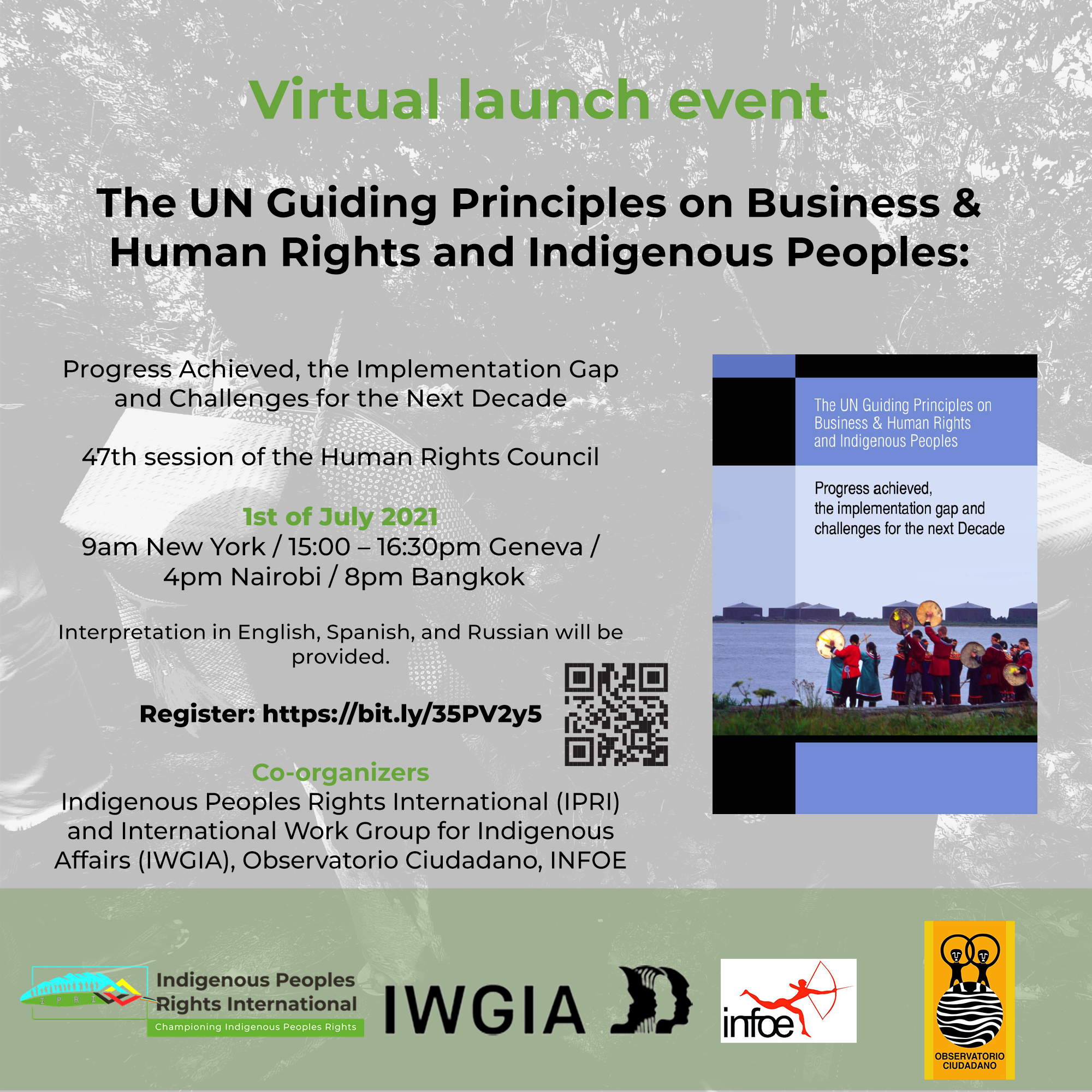
Co-organizers
Indigenous Peoples Rights International (IPRI) and International Work Group for Indigenous Affairs (IWGIA), Observatorio Ciudadano, INFOE
Background and Objectives
At its 47th session, the UN Human Rights Council is marking the 10th anniversary of the adoption of the UN Guiding Principles on Business and Human Rights. On the 28th of June, the UN Working Group on Business and Human Rights is presenting its annual report which is focusing on taking stock of the first decade of implementation of the UN Guiding Principles on Business and Human Rights. (UNGP). Therefore, the organizers of the event , would like to take the opportunity to launch the publication “The UN Guiding Principles on Business & Human Rights and Indigenous Peoples: Progress Achieved, the Implementation Gap and Challenges for the Next Decade”. The launch event also intends to provide an opportunity to continue the dialogue and build on the discussions that will take place in the official side event on the 24th of June which focuses on the review of the 1st Decade of implementation and recommendations on the UNGP implementation.
The UNGP
The adoption of the UNGP on June 16th, 2011, was a milestone achievement by the international community. The first decade of their implementation has seen progress in terms of policy level commitments to protect and respect human rights in the context of business activities. These developments have helped raise awareness and bring necessary attention to the concerns of Indigenous Peoples in relation to business.
Taking stock of UNGP and the implementation of Indigenous Peoples Rights
IWGIA and IPRI’s new publication “The UN Guiding Principles on Business & Human Rights and Indigenous Peoples: Progress Achieved, the Implementation Gap and Challenges for the Next Decade” takes as a point of departure, the2013 thematic report produced by the working group entitled ”Business-related impacts on the rights ofindigenous peoples” (UN Working Group on the Issue of Human Rightsand Transnational and Other Enterprises, 2013) and the 2014 IWGIA’s report “ Interpreting the UN Guiding Principles for Indigenous Peoples” (Rohr & Aylwin, 2014), specifically, the recommendations made in both documents. The new publication clearly shows that these recommendations have not lost any of their relevance but that the efforts undertaken by states and business enterprises to implement them has thus far been insufficient.
The UNGP and Indigenous Peoples Rights
Despite some positive developments occurred during the las Decade, Indigenous Peoples continue facing gross human rights violations related to business activities in their traditional lands and territories. Moreover, new, and emerging threats such increasing violence and killings on indigenous land and of environmental defenders and the growing trend towards criminalization through “anti-terror” have put at risk Indigenous rights defenders and their communities when opposing business projects in their lands and territories.
One of the key findings of the authors of the publication, is that that there is a vast gap between policies and declarations, on the one hand, and practice on the ground, on the other. Crucially, the publication highlights that where there is documented changes on the ground, Indigenous Peoples themselves have been the key drivers of change during the last decade. They have achieved this positive change through the development and implementation of their own autonomous governments and protocols for Free, Prior Informed Consent processes.
During the last Decade, Indigenous Peoples, through the development and implementation of their own autonomous governments and protocols for Free, Prior Informed Consent processes, have successfully laid the foundations for a truly rights-based engagement between themselves, states, business enterprises and other players.
What's next
Projections suggest that the future impacts of business enterprises, including the extractive industries, the agro-industrial sector and the energy sector, are going to increase substantially, as is the risk of more gross abuses of indigenous peoples’ rights in connection with these operations. The provision of adequate mechanisms to prevent and remedy business-related human rights violations should therefore be treated by all parties concerned as a matter of the utmost urgency. In the light of these developments, the authors the publication make a set of recommendations to states, business enterprises, international organizations and financial institutions, and civil society.
This takes into consideration the binding human rights obligations incumbent upon these parties. The report also includes several recommendations to business-affected indigenous peoples which, in the light of the evidence, would appear to offer promising avenues for better protection and restoration of their rights.
This side event aims to:
- Share the main findings of IWGIA’s critical analysis on the implementation of the UN Guiging Principles and indigenous peoples’ rights
- Provide a space for Indigenous peoples’ assessment and perspectives on the implementation of the UNGP and identify actions required to stop emerging threats.
- Provide an opportunity to keep highlighting the crucial importance for advancing in the recognition and protection of Indigenous Peoples rights in the context of the next Decade of implementation of the UNGP.
- Continue to garner support for indigenous Peoples own autonomous governments and protocols for Free, Prior Informed Consent processes to achieve positive change on the ground.

